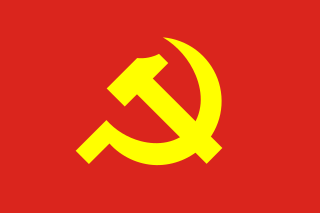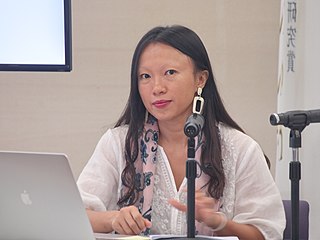Related Research Articles

The Viet Cong was an armed communist revolutionary organization in South Vietnam, Laos and Cambodia. It fought under the direction of North Vietnam, against the South Vietnamese and United States governments during the Vietnam War, eventually emerging on the winning side. It had both guerrilla and regular army units, as well as a network of cadres who organized peasants in the territory the Viet Cong controlled. During the war, communist fighters and anti-war activists claimed that the Viet Cong was an insurgency indigenous to the South, while the U.S. and South Vietnamese governments portrayed the group as a tool of North Vietnam. According to Trần Văn Trà, the Viet Cong's top commander, and the post-war Vietnamese government's official history, the Viet Cong followed orders from Hanoi and were part of the People's Army of Vietnam, or North Vietnamese army.

FPT University is a private university in Vietnam. FPT University is a member of FPT Group and has campuses in Hanoi (main), Ho Chi Minh City, Da Nang, Can Tho and Quy Nhon.

The Central Committee of the Communist Party of Vietnam established 1930, is the highest authority within the Communist Party of Vietnam elected by the Party National Congresses. The current Central Committee has about 180 full members and 20 alternate members and elects the Politburo of the Communist Party of Vietnam.
V-pop, an abbreviation for Vietnamese popular music, is a music genre covering Vietnamese pop music from the 1990s to the present day.
Lawrence S. Ting was a Taiwanese decorated soldier and a pioneer businessman who became one of the largest foreign investors in Vietnam. As founder of Phu My Hung Corporation and Saigon South Urban Development Project, Lawrence Ting was instrumental in the southward expansion of Ho Chi Minh City. Today the neighborhood created by Ting has become “a new sustainable, inclusive, knowledge-based urban center.” Ting received the Ho Chi Minh City Medal of Honor in 1993, and Certificates of Merit of the Government of Vietnam from the Prime Minister in 1997 and 2001. In the 2013 Harvard Business Review article The Big Idea, Building Sustainable Cities, John Macomber of Harvard Business School chose Phu My Hung's Saigon South Development Project started by Lawrence Ting as one of the leading sustainable urban development examples in the world. “Phu My Hung was promoted by industrialists who took a long-term ‘build and hold’ approach and had an infrastructure-first master plan...The Model of Phu My Hung, where thoughtful, long-term oriented, private-sector actors help the world create efficient water, power, and transit solutions, can-and must-be replicated.” Ting received posthumously the Friendship Medal of Vietnam from President Nguyen Minh Triet in December 2007. Lawrence S. Ting School in Ho Chi Minh City, a private non-profit junior high and senior high school is named after him. In 2010, the school became the first Microsoft Pathfinder School in Vietnam. In 2020, Taipei American School names its middle school Lawrence S. Ting Middle School in honor of Ting.
The Hồ Chí Minh Prize is an honorary award given by the government of Vietnam in recognition of cultural and/or scientific achievement. The prize was established by decree in 1981, and has been awarded in 1996, 2000, 2005 and 2012, often posthumously. The prize is named for Ho Chi Minh, who was Chairman and founder of the Workers' Party of Vietnam, that is considered one of the highest honors bestowed by Vietnam.
Ho Chi Minh Thought is a political philosophy that builds upon Marxism–Leninism and the ideology of Vietnamese revolutionary Ho Chi Minh. It was developed and codified by the Communist Party of Vietnam and formalised in 1991. The term is used to cover political theories and policies considered as representing a form of Marxism–Leninism that has been adapted to Vietnamese circumstances and history. The ideology includes views on the basic issues of the Vietnamese Revolution, specifically the development and application of Marxism–Leninism to the material conditions of Vietnam.
The Taipei Economic and Cultural Office, Ho Chi Minh City represents the interests of Taiwan in the southern regions of Vietnam and Cambodia, functioning as a de facto consulate in the absence of diplomatic relations. There is also a Taipei Economic and Cultural Office in Vietnam located in Hanoi, which has responsibility for relations with the northern regions of Vietnam as well as Laos.
The British Vietnamese International School Hanoi is a bilingual international school in Hanoi, Vietnam, offering a British-style education in both English and Vietnamese languages for ages 3 to 18. BVIS Hanoi is located in the Vincom Royal City, Thanh Xuan District and was opened in August 2013. BVIS students follow a combination of the British National Curriculum, the International Early Years’ and Primary Curriculum models up to Year 6. In Year 10, students begin Cambridge Assessment International Examinations (CAIE) in International General Certificate of Secondary Education (IGCSE). In Years 12 and 13, students study for International A Levels.

Trần Tuấn Anh is a Vietnamese politician. His family is originally from Đức Phổ District, Quảng Ngãi Province. He was the Minister of Industry and Trade of Vietnam and a member of the National Assembly of Vietnam 14th term of 2016-2021 of the delegation of the National Assembly of Quảng Ngãi. He attended the Central Economic Commission on February 6, 2021. Before, he had been President of Ho Chi Minh City University of Industry, Vice Chairman of People's Committee of Cần Thơ City and Consul General of Vietnam in San Francisco. Between 2011 and 2013 he was also rector of the Industrial University of Ho Chi Minh City.
Ho Sin Tung is a visual artist who lives and works in Hong Kong.
Socialism in Vietnam, in particular Marxism–Leninism, is the ideological foundation of the Communist Party of Vietnam (CPV) for the development of the country ever since its establishment.
Thảo Nguyên Phan is a Vietnamese visual multimedia artist whose practice encompasses painting, filmmaking, and installation. She currently lives and works in Ho Chi Minh City and has exhibited widely in Vietnam and abroad. Drawing inspiration from both official and unofficial histories, Phan references her country's turbulent past while observing ambiguous issues in social convention, history, and tradition. She has exhibited in solo and group exhibitions in Vietnam and abroad, at many public institutions, including the Factory Contemporary Art Centre, Ho Chi Minh City; Nha San Collective, Hanoi; Rockbund Art Museum, Shanghai; Times Art Center in Berlin, Timișoara; and The Mistake Room, Los Angeles.
Witness Collection is one of the largest private collection of Vietnamese art in the world. It undertakes detailed research into the art in its collection and Vietnam's 20th century history, as well as providing state-of-the-art conservation.

Thủ Đức is a municipal city (sub-city) under the administration of Ho Chi Minh City, Vietnam.

Lê Hiền Minh is a Vietnamese artist known for employing a Vietnamese traditional handmade paper called Dó to construct large-scale installations. Her work acts as a bridge between contemporary and traditional Vietnamese art and also between modern and historical Vietnamese culture. She currently lives and works in Ho Chi Minh City.
Trương Thị Mai is a Vietnamese female politician. She is currently a member of the Politburo of the Central Committee of the Communist Party of Vietnam, a member of CPV Central Committee’s Secretariat, Head of Organization Commission of the Central Committee of the Communist Party of Vietnam, and a member of the National Assembly of Vietnam. She was Head of the Mass Mobilisation Commission of the CPV Central Committee, a member of Standing Committee of the National Assembly, Chairwoman of the National Assembly Social Affairs Committee; Vice Chairman of the Committee for Culture, Education, Youth, Adolescents and Children of the National Assembly, a Standing member of the Hồ Chí Minh Communist Youth Union Central Committee’s Secretariat, abd Chairman of the Vietnam Youth Union.
References
- ↑ "Truong Cong Tung – SeMA Biennale Mediacity Seoul 2014". mediacityseoul.kr. Retrieved 29 Jul 2017.
- ↑ "Journey of a Piece of Soil – Kadist". Kadist. 29 Apr 2016. Retrieved 29 Jul 2017.
- ↑ Museum, 臺北市立美術館 Taipei Fine Arts. "2016台北雙年展 TAIPEI BIENNIAL". TAIPEI BIENNIAL 2016台北雙年展 (in Latin). Retrieved 29 Jul 2017.
- ↑ Trương Công Tùng Retrieved on 13 Feb 2018
- ↑ Trương Công Tùng Retrieved on 13 Feb 2018
- ↑ Trương Công Tùng Retrieved on 13 Feb 2018
- 1 2 3 4 5 6 "Haunted Thresholds". Haunted Thresholds. Retrieved 29 Jul 2017.